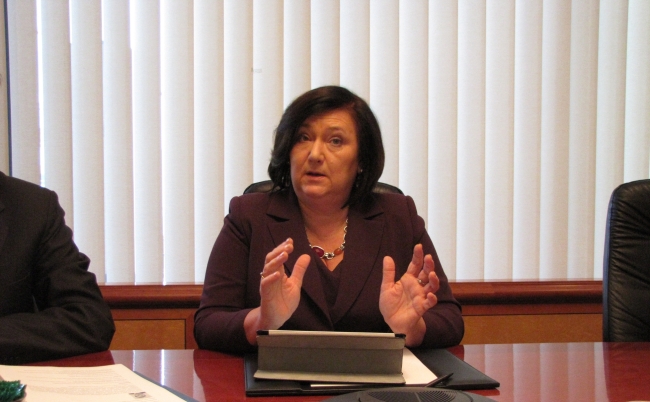What is an erstwhile Korean student of English or another foreign language to do when long hours of study does not seem to pay off? In a country renowned for its all-night cram schools and English study obsession, the first lady of Poland has some sage, albeit straight forward advice ― just relax.
Anna Komorowska, wife of Polish President Bronislaw Komorowski and Poland’s first lady, said, Thursday, Korean students demand too much of themselves when it comes to English learning, during her one-week visit here that included sitting down with her counterpart, first lady Kim Yoon-ok, at Cheong Wa Dae and several activities with the Polish department at Hankuk University of Foreign Studies (HUFS).
Komorowska returned to her home country on Saturday.
“Learning a foreign language should be first and foremost about communicating with others, meeting people from other cultures,” she said in an interview with The Korea Herald.
 |
Anna Komorowska, wife of Polish President Bronislaw Komorowski and Poland’s first lady, gestures during an interview with The Korea Herald in Seoul on Thursday. (Philip Iglauer/The Korea Herald) |
One might think it an odd thing for a first lady to dispense advice about learning foreign languages, but think again. Komorowska has a master’s degree in Philology ― that’s the study of Latin and ancient Roman culture ― from Warsaw University and she taught the notoriously difficult language to high school student for years.
It is enough if Korean students love to learn and are determined, she said chuckling.
She pointed to HUFS Polish language department as a case in point, saying there are 800 Polish language graduates this year. “Philologists believe in the power of the word,”
“The Polish language department was established here even before Polish-Korea diplomatic relations were established,” she said. As it is said in the Bible, ‘In the beginning, there was the word.’”
Komorowska traded teaching legions of high schoolers for raising five children. All the while, she supported her husband’s crusade for democracy and freedom in Poland’s Solidarity Movement through the 1970s and ‘80s.
She created with other women a self help group designed to find their husbands who had been arrested or “disappeared” by the communist government in the crackdown in a 1980s.
“There was a saying at that time, ‘If you are not arrested now, you have been arrested before and you will be arrested again soon enough,’ she said.
She delivered a congratulatory speech at the 3rd International Polish Studies conference organized by the Three East Asian Nations’ Polish Studies Association (SPTK) to promote friendly competition and cooperation among Polish departments in universities in Korea, Japan and China.
By Philip Iglauer (
ephilip2011@heraldcorp.com)








